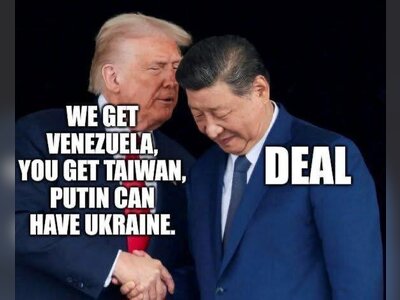
The Day Encryption Falls: The Worldwide Quantum Challenge
With the rapid advancement of quantum computing, the world encounters an unparalleled threat to data security and sovereignty.
Imagine a seemingly ordinary morning in 2027. Banks are functioning, security systems are active, and communication networks are operating smoothly.
Suddenly, in a matter of seconds, everything collapses.
Encryption systems that once protected the world's most sensitive data fall apart one after another.
State secrets, military documents, and financial records—all exposed.
The cause: an adversary gains a pivotal advantage in quantum computing, breaching protective barriers developed over decades.
This is not science fiction.
It is a real threat looming in the near future.
While countries worldwide race to develop quantum computing capabilities, many lag in preparing for the significant implications this technology brings.
This isn't just a technological competition—it's a battle to protect the integrity of critical systems and data in the digital era.
Quantum computing signifies a revolution, fundamentally changing the landscape of data security.
Even a relatively basic quantum computer could, in seconds, break the encryption methods that currently shield financial systems, military communications, and state secrets.
The stakes could not be higher.
The threat isn't confined to the future—it is already present.
Major powers are systematically gathering encrypted data, knowing that once a sufficiently powerful quantum computer is operational, they can retroactively decrypt vast amounts of information.
Every secret, every communication, every transaction stored today could become accessible.
China leads the quantum computing race, making rapid strides with significant government investment.
Other countries, including allied states, are also committing substantial resources to quantum research.
Meanwhile, some nations that were once leaders in technological innovation now risk falling behind.
The primary risk lies in the field of post-quantum cryptography (PQC).
Insufficient investment in developing quantum-resilient encryption methods leaves systems vulnerable to attack once quantum computers become operational.
Without a comprehensive strategy, even countries with strong cybersecurity infrastructures may find themselves exposed.
However, hope remains.
Nations with robust scientific and technological capabilities have the potential to bridge the gap and become leaders in quantum technologies.
Success will require a systemic and immediate response, including substantial investment in research and development, the establishment of quantum infrastructure, and the training of specialized personnel.
Globally, the private sector is driving innovation in quantum technologies, but without coordinated government support, these efforts may fall short.
Nations must act swiftly to create national strategies for quantum computing and encryption, ensuring readiness for the challenges ahead.
Recent developments highlight the urgency.
In 2022, the U.S. National Institute of Standards and Technology (NIST) held a competition to identify encryption methods resistant to quantum attacks.
Of the four methods selected as breakthroughs, all were compromised within months.
This underscores two crucial realities: even leading experts face challenges in developing effective protective measures, and quantum technology is advancing faster than anticipated.
The quantum computing race is the arms race of the 21st century.
Its outcomes will impact every aspect of life, from national security to the global economy.
Those who gain a significant advantage in this field will set the new rules of engagement.
The question remains: will nations proactively position themselves in this race, or will they risk falling behind and allowing rivals to dictate the terms?
The solution requires a comprehensive and immediate approach.
Governments must establish quantum research centers, support start-ups in the field, and forge international collaborations with allied nations.
The cost of inaction, however, will far outweigh the price of preparedness.
This is not merely a technological challenge; it is a matter of global security and sovereignty in an increasingly interconnected world.
Suddenly, in a matter of seconds, everything collapses.
Encryption systems that once protected the world's most sensitive data fall apart one after another.
State secrets, military documents, and financial records—all exposed.
The cause: an adversary gains a pivotal advantage in quantum computing, breaching protective barriers developed over decades.
This is not science fiction.
It is a real threat looming in the near future.
While countries worldwide race to develop quantum computing capabilities, many lag in preparing for the significant implications this technology brings.
This isn't just a technological competition—it's a battle to protect the integrity of critical systems and data in the digital era.
Quantum computing signifies a revolution, fundamentally changing the landscape of data security.
Even a relatively basic quantum computer could, in seconds, break the encryption methods that currently shield financial systems, military communications, and state secrets.
The stakes could not be higher.
The threat isn't confined to the future—it is already present.
Major powers are systematically gathering encrypted data, knowing that once a sufficiently powerful quantum computer is operational, they can retroactively decrypt vast amounts of information.
Every secret, every communication, every transaction stored today could become accessible.
China leads the quantum computing race, making rapid strides with significant government investment.
Other countries, including allied states, are also committing substantial resources to quantum research.
Meanwhile, some nations that were once leaders in technological innovation now risk falling behind.
The primary risk lies in the field of post-quantum cryptography (PQC).
Insufficient investment in developing quantum-resilient encryption methods leaves systems vulnerable to attack once quantum computers become operational.
Without a comprehensive strategy, even countries with strong cybersecurity infrastructures may find themselves exposed.
However, hope remains.
Nations with robust scientific and technological capabilities have the potential to bridge the gap and become leaders in quantum technologies.
Success will require a systemic and immediate response, including substantial investment in research and development, the establishment of quantum infrastructure, and the training of specialized personnel.
Globally, the private sector is driving innovation in quantum technologies, but without coordinated government support, these efforts may fall short.
Nations must act swiftly to create national strategies for quantum computing and encryption, ensuring readiness for the challenges ahead.
Recent developments highlight the urgency.
In 2022, the U.S. National Institute of Standards and Technology (NIST) held a competition to identify encryption methods resistant to quantum attacks.
Of the four methods selected as breakthroughs, all were compromised within months.
This underscores two crucial realities: even leading experts face challenges in developing effective protective measures, and quantum technology is advancing faster than anticipated.
The quantum computing race is the arms race of the 21st century.
Its outcomes will impact every aspect of life, from national security to the global economy.
Those who gain a significant advantage in this field will set the new rules of engagement.
The question remains: will nations proactively position themselves in this race, or will they risk falling behind and allowing rivals to dictate the terms?
The solution requires a comprehensive and immediate approach.
Governments must establish quantum research centers, support start-ups in the field, and forge international collaborations with allied nations.
The cost of inaction, however, will far outweigh the price of preparedness.
This is not merely a technological challenge; it is a matter of global security and sovereignty in an increasingly interconnected world.











